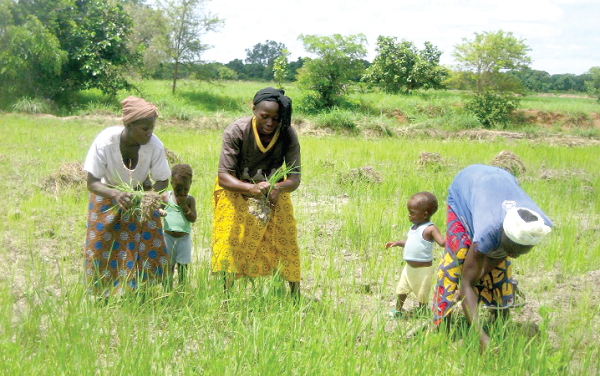
Advancing rural women’s land rights in Ghana - Kilimanjaro initiative
The issue of women’s land rights is one of the human rights issues that are not given enough attention; however, about 50 to 60 per cent of rural women in Ghana constitute the labour force within the agricultural sector, yet only 10 per cent earn income and eight per cent own land. The limited land ownership and rights have led to limited access to productive resources.
Advertisement
It is on this backdrop that 500 rural women from 22 African countries made history at Mt Kilimanjaro on the occasion of International Rural Women’s Day celebrated on October 15, 2016, by boldly declaring their land rights.
Out of the 500 rural women who converged on the foot of Kilimanjaro, 29 of them hiked to the top to declare African rural women’s land rights, and upon their return, the heroes and the rest proclaimed a 15 Charter of Demands.
The charter has since been presented to the African Union (AU) which will subsequently work with national governments for actualisation of those demands at country level.
The question one may ask is, why Mt Kilimanjaro? It is the highest mountain in Africa which symbolises the challenges and the victory of women thereof. It is tough to climb, but after climbing, the individual feels motivated and satisfied to have achieved something worth celebrating.
Thus, Mt Kilimanjaro symbolises the challenges of the rural women and also the starting point to spread their message throughout Africa; from the highest point to the lowest point of Africa.
Enough evidence exists to attest that the AU and national governments have undertaken a number of initiatives in advancing women’s land rights. These include the enactment of a number of legal frameworks and guidelines on land policies at regional and national levels.
These guidelines provide a road map in ensuring that the land sector environment functions in its proper role in ensuring economic growth, poverty alleviation and environmental sustainability, particularly strengthening women’s land rights.
Also, the AU Land Policy Initiative (LPI) has set a target for national governments to achieve 30 per cent registered land for women by 2025.
Women and access to land in Ghana
In Ghana, the government has championed and implemented the Land Administration project over the past 10 years, with women’s land rights forming a key priority area of this project.
The Constitution and other laws such as the Intestate Succession Law, 1985, Head of Family Accountability Law, 1985, Customary Marriage and Divorce Law, 1985, all reiterate equality of all persons before the law and the protection of the rights of citizens to own property.
Although many countries have signed on to this commitment and developed a number of land policies in conformity with the AU framework and guidelines, there is still significant evidence suggesting that the rights of vulnerable groups, including women, are not fully protected when it comes to access and use of land as a factor of production.
A range of economic, social and cultural factors have been identified to have stood in the way of the law. The AU and national governments have failed to provide enough pragmatic steps in ensuring the actualisation of policy interventions they spearheaded, leading to high evidence of both income and gender inequality gaps around land.
Rural women capitalised on the Kilimanjaro initiative to spill out their frustrations and setbacks on their land rights. This campaign was first conceived at a meeting of rural women and civil society organisations (CSOs) in 2012, held in Dar es Salaam, Tanzania, led by civil society organisations.
In November 2014, in a meeting in Addis Ababa, non-governmental organisations (NGOS) resolved on the urgent need to involve rural women to run with the idea. The campaign aims at creating space for rural women to be able to participate in decision-making processes on issues pertinent to them.
The key objectives of the campaign are to strengthen the agency and movement of rural women in claiming and defending their land and natural resource rights in Africa and to engender political will among national governments, donors and regional institutions to implement an all-inclusive African women’s charter.
Some of the key provisions in the Charter of Demands highlighted for prioritisation by the government and land sector stakeholders include:
- Sensitisation of leaders, including traditional, community, religious and land sector actors, youth, people with disabilities and women, to land laws and policies.
- Women empowerment by enabling them to access their land rights, technology and financial resources to improve their livelihood.
- Banning of harmful and oppressive cultural practices that undermine women’s rights, including those that prohibit women from inheriting land and other resources.
- The need for women and communities to have a say in what investors and companies invest in their communities. The investors must be obligated to provide information about the impact of their investment (sustainability - economic, environment, health, social and infrastructure).
- Enacting inheritance laws to safeguard women’s land rights wherever it does not exist.
- Translating and simplifying land policies and laws into accessible local languages.
On the occasion of the International Women’s Day celebrations, with its theme: “Women in the Changing World of Work: Planet 50:50 by 2030,” it is important we reflect on what this means to rural women, particularly their land rights.
Women in Law and Development in Africa (WiLDAF) wishes to use this opportunity to draw on the outcomes of the Kilimanjaro initiative and to call on the government and land sector stakeholders to endorse this initiative by CSOs and rally their support behind rural women in championing their cause by endorsing the Charter of Demands and work towards its effective implementation and actualisations of the campaign objectives.
This, when taken into consideration, will go a long way towards advancing women’s land rights in Ghana.
The writer is the Programme Officer, Women in Agriculture
WiLDAF - Ghana




